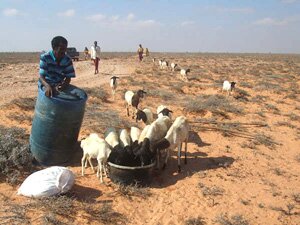 Bartamaha (Nairobi):- Fighting between two sub-clans over grazing pasture and water has left 20 dead and thousands of families displaced from several villages in central Somalia, say locals.
Bartamaha (Nairobi):- Fighting between two sub-clans over grazing pasture and water has left 20 dead and thousands of families displaced from several villages in central Somalia, say locals.
“In my own town of Galinsor, about 1,300 families [7,800 people] have been displaced, out of a total population of 5,500 families,” Osman Abdi, an elder, told IRIN on 9 November. “Many of the families have fled to surrounding villages and are living in the open or sheltering under trees.”
An aid worker in the region told IRIN many of the displaced were nomads who were forced to flee their water sources. “They are now in areas where there are no water points,” he said. “The lucky ones have camped outside urban centres like Adado. They and their livestock are at risk.”
The fighting, which went on for a few days, pitted the two sub-clans of the main Hawiye group, the Sa’ad and Seleeban, against each other. Both clans were seeking pasture and water for their livestock following a drought.
“Resources, such as pasture and water, are at the root of the fighting. There is also an element of revenge killings,” said a resident of Adado district, 30km south of Galinsor, which was the epicentre of the fighting.
Apart from Galinsor, other displaced civilians came from Bandiiradley, and the villages of Wad, BeenDharte, Dayno, Sarman and Biya Gadud. At least 1,500 families [9,000 people] fled Bandiiradley, 20km to the north of Adado.
“We have not had the expected rains [Deyr rains] and the area is parched,” Abdi said. “They have very little access to water and food and we don’t have anyone helping.” Many of the families, he added, had been displaced for almost a week and the security situation remained tense.
“Our estimate is that between 2,000 and 2,500 families have been displaced,” said the aid worker, calling for mediation efforts to ease the tension and allow people to return home.
The two groups have fought over grazing land and water sources sporadically in the past. Last week, both sides used heavy weapons, including machine guns and anti-aircraft guns, and “technicals” [battle-wagons fitted with heavy machine guns] in an area with very little cover, before the fighting subsided on 7 November.
Government spokesman Abdi Haji Gobdon said the new Somali Prime Minister Mohamed Abdullahi Mohamed had met members of parliament from both sides, as well as elders, and expressed his regret at the fighting. He called on both groups to end the hostilities and resolve their differences through dialogue.
An estimated two million Somalis need humanitarian assistance, according to the UN. At least 1.4 million Somalis have been displaced by fighting between government forces and Islamic insurgents, who control much of south and central Somalia, including parts of Mogadishu.
==================
Source:- IRIN.



